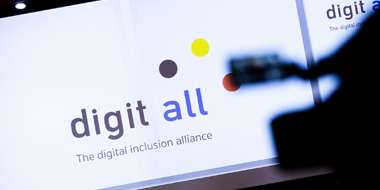Government
Governments are at an inflection point in terms of rising citizen expectations, decreasing budgets, a aging workforce, and outdated infrastructure. Governments need to digitally transform to deliver services citizens want and need. The public expects the agility and efficiency found in the private sector, and governments must embrace new technology, processes, ideas, and workforce skills to thrive.
IBM, together with 30 organizations, signs the Digital Inclusion Charter
“I personally believe that inclusion is a basic human right and should be part of the DNA of every leader. Since a long time, inclusion is one of the core values of IBM. The Digital Inclusion Alliance is for me a great initiative, where we can turn our values into action. We’re all in this […]
The importance of asking the right questions for record systems in the public sector
Document handling is a fundamental part of any organization, including the public sector. However, the public sector faces a unique set of challenges that could be helped by the private sector simply asking the right questions. Challenges in the public sector While there is some overlap between the challenges regarding document handling found […]
The easiest way to anonymize public sector data before publication
Starting in 2022, the new WOB/WOO legislation will be implemented in the Netherlands, requiring public authorities to proactively publish data. However, in response to privacy concerns, the published documents need to be anonymized before publication. How will public authorities keep up with the demands of anonymizing large amounts of documentation while data sources are […]
Smarter data handling in the public sector for better information access and citizen experiences
Improved accountability. Increased citizen trust. More optimal working processes. Guaranteed compliance with regulations. Easier search functionality. It’s clear that good data and information management in the public sector results in a multitude of benefits. However, this isn’t always straightforward to implement. Especially when you consider that this isn’t just a technological change, but also […]
What is human-centred AI and why is it important?
Artificial Intelligence (AI) has the potential to solve many of the most difficult problems of today and tomorrow, impacting every aspect of our lives. Most people are likely to agree that AI should be used to solve problems and make (all) humans more prosperous and healthier. Actually, achieving this is easier said than done, […]
Dutch Ministry of Defense signs contract for modern and flexible IT
State Secretary Barbara Visser of Defense signed a contract with IBM, on behalf of the market consortium Athena (IBM/Atos/ Unica) to start in 2021 with the realization of a renewed, future-proof IT infrastructure. Focus will be on the IT infrastructure-parts that have the most added value for operational actions. The Ministry of Defense service […]
Becoming Quantum Ready
Four years after the launch of IBM’s first public quantum computer, the company has 22 systems available to clients and community, which now includes 230,000 users and 111 IBM Q Network client partners. Additionally, 180 billion quantum circuits have been executed using our hardware, resulting in more than 240 publications by researchers around the world. […]
Waarom het tijd is voor digitale heruitvinding in de publieke sector
Stel je een toekomst voor waarin overheden proactief en persoonlijk bezig zijn met de behoeften van hun burgers. In plaats van in de rij te moeten wachten en gereduceerd te worden tot een nummer, zou je snel en makkelijk in interactie moeten kunnen gaan met overheidsdiensten. Zoals wanneer je een pizza bestelt met je […]
Pourquoi le temps de la réinvention digitale du secteur public est arrivé
Imaginez un futur dans lequel les autorités publiques pourraient répondre de manière proactive et personnalisée aux attentes des citoyens. Plus besoin de faire la queue et plus question d’être réduit à un simple numéro : les citoyens pourraient accéder aux services publics et interagir avec eux aussi rapidement et facilement que lorsqu’ils commandent un repas […]







